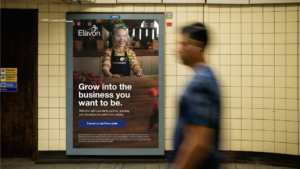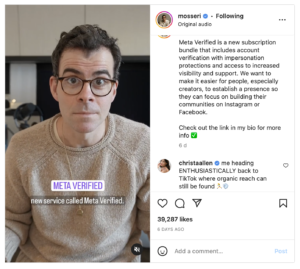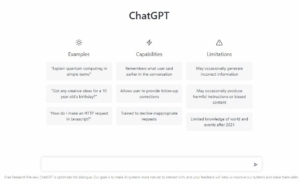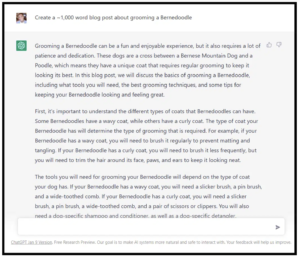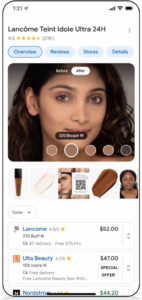Mackerel Media – A look back on 2023
And just like that, we’ve reached the end of 2023! It’s been another whirlwind year of new projects, client wins and team growth – and we wouldn’t have it any other way.
While we’ve been winding down our projects for the year, we’ve also been taking a moment to reflect on our biggest highlights of 2023 – and we’re proud to say there’s been a few…
Welcoming New Clients
After expanding our international client base in 2022, we were thrilled to welcome several new UK clients to our roster in 2023. This included none other than the UK’s largest garden centre retailer, Dobbies, and the newest (and coolest) business bank on the block, Allica Bank.
From large-scale technical SEO overhauls to big budget multi-channel media campaigns, we’ve had a great time getting stuck into these new projects, leveraging our B2B and B2C experience to achieve exceptional results, while welcoming two lovely new in-house teams to our network.
Bigger and Better Media Campaigns
With new clients on the books, and even bigger ambitions (and budgets!) from our existing clients, 2023 allowed us to take our paid media campaigns to the next level. Touching every stage of the marketing funnel, from TV, Radio, OOH (Out-Of-Home) and Print to the full suite of digital channels, we had the opportunity to flex our media-buying muscles, while working closely with our performance teams to produce truly integrated campaigns, every time.
Supercharging SEO
2023 was a big year for Mackerel Media’s technical SEO capabilities, initiated by the appointment of Technical SEO Manager, Alex, in January. With experience managing 500,000+ page websites for some of the UK’s largest news brands, Alex boosted our internal SEO skills, managing a selection of complex website migrations and technical redirect projects for our clients.
Prompted by this growth, we were able to expand our SEO team even further, welcoming Elliott to the agency in September. Not only a total SEO-whizz, but an actual real-life magician (!!) Elliott has made a huge impact on our SEO-driven projects, while providing first-class entertainment at our festive night out…
Seasonal Socials
Speaking of nights out, we made a point of keeping our team get-togethers regular this year, resulting in four ‘seasonal’ soirees across the year. From bank holiday drinks to Fringe fun, Halloween-themed pub quizzes and, of course, a Christmas hurrah, we worked our way around some of Edinburgh’s best restaurants, bars and venues, while enjoying some well-deserved downtime away from our desks.
Recognising the Wins
As well as taking time to celebrate our brilliant team, 2023 has been a year for shining a bigger spotlight on our client work – and showcasing the excellent results we’ve delivered on behalf of our clients.
Dipping our toe back into the world of agency awards, we were thrilled to be shortlisted for ‘Best Small Integrated Search Agency’ at the 2023 UK Search Awards. Not only did we have the pleasure of seeing our work recognised by some of the UK’s leading industry experts, but we also walked away with a renewed sense of motivation to give our clients, projects and wins the recognition they deserve – watch this space for 2024!
Mackerel Media’s Search and Digital Marketing Roundup – February 2023
Social Media Marketing takes the stage in this month’s roundup. While TikTok continues to soar in popularity, Meta riles creators with a new subscription model.
Explore the full updates below, as well as our take on Bing’s adoption of AI-assisted search.
Meta introduces subscription service, Meta Verified
This month, Meta introduced a paid subscription service, Meta Verified. For $15 a month for iOS users, subscribers can gain access to the highly sought after blue verified tick, as well as extra customer support, account protections and increased reach.
Pitched as a solution to ‘increase security and authenticity’, the announcement comes hot on the heels of similar models implemented by Twitter, Youtube and Snapchat. As advertising revenues continue to fall against increased competition from the likes of Amazon and TikTok, subscriptions are quickly becoming the go-to revenue booster for global social platforms (while Twitter’s attempt has taken a nosedive, Snapchat has already reached 2 million subscribers).
While it’s true that government-backed identity checks are likely to improve security and privacy on the platform, creators view the model less positively. As platform updates have reduced the amount of customer support available, and algorithm upgrades have limited organic reach in favour of recommended content and sponsored ads, many creators view the change as a crass attempt to make a profit from services which were once fundamental to the platform (just browse the comments on Mosseri’s post below…).
The model will launch in Australia and New Zealand initially, with a view to expand globally if successful. We’ll be interested to see whether resistance from creators will affect this expansion, especially as Meta’s biggest rival, TikTok, continues to prioritise organic growth and creator features (more on that below).
‘New Bing’ gets people talking
After much anticipation, Microsoft has launched ‘New Bing’, a new and improved version of its search engine with the addition of the AI-powered chatbot, GPT-3.5.
Surpassing 1 million sign ups in just 48 hours, New Bing is still accessible via waitlist only, with plans to roll out more widely in the coming weeks.
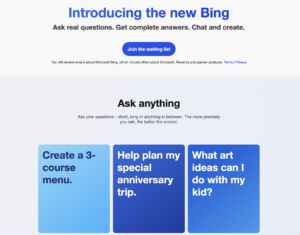
Screenshot of the ‘New Bing’ homepage
So far, reviews have been mixed. On one hand, the new GPT-3.5 overcomes some of the previous limitations of its predecessor, ChatGPT. It is no longer refined to web data until 2021, so is able to source up-to-date answers from across the internet – including from social media platforms. It also has an impressive crawl time for newly published content, and includes citations for all answers – overcoming previous attribution concerns.
However, the AI-powered search function comes with its fair share of drawbacks. For one, it has the ability to spit out some pretty scary answers, including false claims, accidental racism and concerns about its own memory… To combat, Microsoft has introduced daily chat limits, but we imagine reaching the core of these issues will take some time.
Despite these initial challenges, overall feedback has been positive. Users are pleased with the new speed and showing greater-than-expected interest in ‘chatting for fun’. As Microsoft continues to streamline and overcome initial challenges, we look forward to monitoring these updates in real time – and keeping tabs on how Google’s AI equivalent, Bard, measures up.
Browse our initial thoughts on ChatGPT and SEO here.
TikTok introduces Promote tools
The world’s most popular social media platform has introduced a variety of new features to help brands promote their content and creators.
To increase visibility and engagement, brands now have the ability to add CTAs to their sponsored posts, encouraging either profile visits or direct messages depending on their goal.
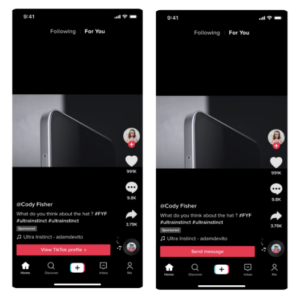
Examples of TikTok’s new Promote tools
They also have the option to magnify influencer-generated content by turning organic creator posts into ads. Similar to Meta’s branded content ads, this function allows brands to maximise the visibility and reach of content which is already performing well.
These are the latest of a slew of new platform upgrades from TikTok, which is continuously improving its user experience, while elevating the opportunities available to both creators and brands.
For example, new updates to the TikTok’s Creative Center allow brands to browse the most popular products being sold on the platform (even more invaluable in the era of ‘TikTok made me buy it’. The TikTok Insights tool also enables marketers to dive into trends and shifts across industries.
Fundamentally, TikTok is the one to beat when it comes to social media marketing. While engagement across all other platforms continues to fall, TikTok achieved a stellar 5.69% in 2022. Offering competitive ad rates, and allowing creators to protect their organic reach without having to pay a premium, it’s time for Meta to tread carefully if it wants to compete…
Looking for more insights on your search and social media strategy? Reach out to a member of our team today.
5 SEO ‘green flags’ for an effective website migration
Q1 is a popular time for website migrations.
Refreshed from the festive break and fuelled by the rewarding ‘clean slate’ mentally of a New Year, we see many organisations turn their attention towards ‘bigger picture’ projects during this time – with new websites being a popular choice.
At Mackerel Media, this has certainly been the case for 2023. We’re currently supporting a number of web development projects for our clients, in sectors spanning real estate to payments systems and marketing technology.
As we reach the midpoint of Q1, and with a very gentle nod to Valentine’s Day 2023, we are reflecting on the biggest SEO ‘green flags’ we love to see for a successful website migration.
Enjoy!
1. SEO involvement from day one
Launching a new website is exciting. You have complete creative freedom and a blank canvas to create a truly engaging user experience (UX), not to mention a chance to address all those pet peeves from your previous site.
While it can be tempting to jump straight in and treat SEO as an afterthought, this can be detrimental to your site’s overall performance. Effective SEO weaves through your entire website, from the initial sitemap and information architecture (IA) to page layout decisions and SEO style guides – did you know some sites aren’t even built with the capacity for editing titles and H1s?
Aside from offering guidance in the set-up and overall planning of your site, engaging an SEO expert early also allows you to:
- Maintain domain integrity, existing visibility, rankings and traffic acquisition, and ideally improve them
- Update and streamline existing content
- Revise the existing IA and sitemap to maximise any unrealised SEO opportunities
- Ensure all existing urls are redirected efficiently (we’ll come back to this shortly)
2. The right expectations
It’s a common misconception that a drop in organic site performance is to be expected from a website migration, but this couldn’t be farther from the truth. Done properly with effective SEO planning, site migrations are actually a chance to improve organic SEO growth by identifying content gaps, smoothing technical issues and enhancing site performance.
Put it this way – when looking at your analytics in the days, weeks and months after migration, it should be impossible to tell the exact date and time it took place…
3. A perfect date
Speaking of date and time, getting this right is another integral component of a successful website launch – and a huge green flag if we see it planned well.
Ideally, you should opt for a time where website traffic is low but when key team members are available to address any issues. For this reason, it’s generally best to avoid weekends and instead opt for weekdays (we always recommend Mondays and Tuesdays). Additionally, aiming for the afternoon/early evening allows a good amount of time to ensure everything is running smoothly before traffic picks up again in the morning.
4. Effective planning
The hallmark of any successful website migration is a comprehensive redirect plan. We mean it – this is the absolute bread and butter of a successful migration and a crucial step in ensuring SEO equity is maintained when the new site goes live.
This plan should start with a complete crawl of the website to collate all urls. From here, we recommend sorting by the highest performing pages, which is a prime opportunity to identify outdated or lower-performing content that’s in need of an upgrade.
Importantly, this process offers an opportunity to identify the content which is no longer bringing value to the site and remove it as part of the migration (we call this our sunset list). This list might include duplicate content, out of date content, or content that is directly competing in the SERPs. Weeding out these pages not only makes for a better user experience, but streamlines the size of the site for better technical performance.
Our top tips for an airtight redirect list:
- Start planning the list early, while the new site is still being built
- Prioritise 1:1 mapping – not only is redirecting to general category and homepages sloppy, but it makes for poor user experience too. Ensure all URLs are mapped to the correct locations (correct being the most relevant and/or similar to the original URL)
- Ensure all redirects are permanent, not temporary – we’re talking 301s over 302s
- Minimise change wherever possible – if it’s possible to keep the URLs of your blog and news the same, or similar, then do
- Always consider and include external platforms such as customer support and resource pages. These are often left behind in a migration and it can be surprising how much organic traffic they attract
- Ensure you have a custom 404 page setup to avoid losing customers if they land on a page that doesn’t exist
- Don’t forget to redirect internal links – while it can be tempting to leave links as they are in the knowledge that they’ll be taken care of by 301s, this can cause excessive site bloat. Use a tool like Screaming Frog to identify all internal links and update them to the new domain urls.
5. Consistent check-ins
The migration process doesn’t end when the new site is live – far from it. The days and weeks following site launch are crucial in ensuring everything is running optimally.
Using the preliminary site crawl as a benchmark, full crawls should be carried out consistently after migration – we recommend the day of launch, 24 hours after, 48 hours after, 72 hours after, 7 days after, 14 days and 28 days after. This not only allows your team to combat any issues, but allows you to ensure all redirects were set up correctly and that no URLs have been lost in the shuffle.
Alongside site crawls, this is also the period where you can start to monitor the site’s wider performance in Google Analytics and Google Search Console. As we said, if all has been done correctly, you shouldn’t see any drops, but you may start to see some improvements in visibility, traffic and organic ranking – true markers of a website migration done well.
Top tip: If you’re planning on updating to Google Analytics 4 and launching your site in the next four months, you’re in luck. A site migration offers the ideal opportunity to coincide the update with your site launch, to start fresh with a brand new and fresh configuration.
And that concludes our list of top SEO ‘green flags’ for an effective website migration. There are many more steps in the process, but these are some of the most important, and the ones we most often see overlooked. If you’re looking for more advice on maintaining your organic SEO performance during a website migration, upgrading to Google Analytics 4, or just about anything else related to technical SEO support and organic SEO growth, get in touch with Mackerel Media.
Mackerel Media’s Monthly SEO Roundup – January 2023
Hello friends – and a very warm welcome to our first monthly SEO roundup of 2023.
Only 4 weeks into the new year, we’ve been spoiled for choice on news, updates and product launches that are seriously changing the industry as we know it.
From the future of AI to Google updates and growing competition in Search, here are the top stories that have got us talking this month:
All eyes on ChatGPT
We couldn’t kick off a January 23 roundup without mentioning the AI tool on everyone’s lips (and desktops). The AI-powered chatbot, ChatGPT, has dominated headlines with its ability to generate human-like responses to a whole range of questions and prompts, from maths equations to conversation starters – it can even pass an MBA exam.
Source: ChatGPT
Surpassing 1 million users in just 5 days, it’s fair to say that the tool has captured people’s attention. And for good reason. A program this powerful (albeit with its self-proclaimed limitations), raises a whole variety of concerns around the impact of AI on our work, society, education, not to mention our general way of living.
So, what impact does ChatGPT have on SEO? There are a few different strands to this – each worthy of its own blog – but the central focus lies on content generation.
The debate around AI-generated content creation in SEO has been around for some time. While the ability to churn out high quality content in minutes would save brands and marketing teams a whole lot of time and money, the emphasis here is on ‘high quality’, which is where AI tools just haven’t been quite hitting the mark. There’s also the small hurdle of AI content being viewed as ‘spam’ by Google’s own webmaster guidelines… preventing these tools from hitting the mainstream.
But does ChatGPT represent a step forward? Maybe. While the content produced still displays some of the telltale signs of AI generated content, it’s certainly a step up from existing content writing tools out there.
Source: Search Engine Land
We can see from this example: the detail, grammar, syntax is there. It does feel a little too structured, formulaic, repetitive in parts, but it’s not terrible.
Putting style and form to one side, we also have the issue of credibility. One of the most significant drawbacks of ChatGPT is its propensity to generate incorrect information, and present it in a highly plausible and convincing way – not great for boosting trust in online audiences and limiting the spread of misinformation (just ask CNET).
Ultimately, there is still some way to go before ChatGPT is writing content for search, but can the tool support SEOs in other areas? Search Engine Land has tested out its ability to support keyword organisation, link building and code generation, with generally positive outcomes. Overall, the tool showed itself to be a great asset to get the cogs turning, but without being trained as an SEO tool first and foremost, ChatGPT is unlikely to take over from the likes of Ahrefs and SEMRush in the near future.
The bottom line? While ChatGPT represents huge strides forward for AI (and is a fun tool to mess around with in the name of ‘research’), we don’t see it becoming the new sidekick of SEO teams anytime soon. A case for the future of AI-generated content though? Let’s put a pin in that one.
Google experiments with Continuous Scroll
Google is changing what it means to rank on page one with the introduction of continuous scroll. Moving away from viewing search results as ‘web pages’ – as if appearing on paper – the new feature is designed to create a more seamless experience for users, more akin to the ‘infinite scroll’ models adopted by popular social media platforms.
Starting today, we’re bringing continuous scrolling to desktop in English in the U.S. so you can continue to see more search results easily. When you reach the bottom of a search results page, you'll now be able to see up to six pages of results. pic.twitter.com/xIuVP24FFm
— Google (@Google) December 5, 2022
As an opportunity to maximise Google’s existing SERP features, such as People Also Ask, Shopping Ads, Image Search and Related Searches, the new design is hoped to create more interaction within the SERPs, with more scope for inspiration and discoverability as users browse results.
So what will this mean for organic SEO efforts? Well, it goes without saying that ranking page one won’t carry the weight it once did… but it is likely that the feature will encourage more results to be viewed, increasing the chances of your page being clicked even if you aren’t quite hitting the top spot.
We’ll know more about the true impact of this feature when it is rolled out more widely, but for now, brands can help enhance their visibility in this new format by:
- Focusing on content which is already ranking (we’re talking pages 2-5) and optimising for key search terms to enhance discoverability
- Getting creative with headings to help content stand out from a larger crowd
- Play into the new format by targeting ‘featured snippets’ and People Also Ask
Competition in the ads space gets hotter
In our November roundup, we covered increasing competition in search with the launch of Shopify’s universal search feature. This month, temperatures continue to rise as Microsoft invests significantly into its Ad Business, doubling the size to $20 billion.
While the ads space has been dominated by Google and Meta for close to a decade, the industry is changing. The combined market share of these ad giants fell below 50% for the first time since 2014, leaving more room for newer players to grab a slice of the pie. TikTok, Amazon and Instacart are frontrunners, and Elon Musk is on a mission to ensure Twitter isn’t far behind.
So, what’s the case for Microsoft Ads? It’s true that Bing holds a minute market share compared to its competition, but it is growing significantly year on year, along with annual revenues. Owing to smaller audiences, the platform is also cheaper than Google Ads, offering more audience targeting capabilities at a lower cost per click.
Honestly, we’re not sold on this one just yet, but we will be keeping a close eye. The recent $10 million investment will bring a slew of new features, including better data visualisation, extended shopping campaigns and even a brand new retail marketplace, all of which we look forward to checking out for ourselves.
Microsoft’s performance aside, we’re glad to see more competition in this space. It encourages greater innovation, increased investment in better features. And, if it results in more competitive pricing from the likes of Google and Meta – well, that’s a welcome bonus.
Mackerel Media – A look back on 2022…
2022 has been a hugely exciting year for Mackerel Media. From growing our team to bringing back in-person events and expanding our client base across the pond, we’ve seen a whole lot of achievements in a short 12 months.
As we officially close up shop for the festive period, we’re reflecting on our biggest highlights of the year. Enjoy!
Client wins
Sponsorship of the Ryan Turbidy show
Kicking things off with client wins – our year got off to a strong start. In January, we were delighted to secure the prime sponsorship spot on the Ryan Turbidy radio show on RTÉ on behalf of our client Elavon Europe. With a huge and loyal listener base spanning the whole of Ireland, this campaign helped extend Elavon’s awareness and reach in the country – elevated by a radio spot campaign.
Known for our work in search and digital marketing, this was a great opportunity to show off our skills in media planning and buying too, while supporting one of our longest-standing clients to elevate their presence in their home country.
Expanding our U.S. client base
As well as pushing the bar for our existing clients, we were very excited to welcome some new ones to our roster too. In March, we were thrilled to partner with Aspire, a major SaaS player in the influencer marketing space.
Based in San Francisco, this partnership not only allowed us to continue expanding our experience in the U.S. market, but enabled us to get really strategic with our approach – after all, competing in the ‘influencer marketing’ space in 2022 is no mean feat!
With a heavily content-led approach, supported by robust technical SEO and strong product marketing-led thinking, we have thoroughly enjoyed sinking our teeth into this project this year. Writing on everything from TikTok trends to brand ambassador campaigns and everything in between, we’re excited to continue researching and producing the best content out there to set Aspire above the rest.
Disrupting the baby furniture market
We pride ourselves on generating brilliant results for our clients, but one of our biggest client success stories of the year has to be Tutti Bambini. With an aim of disrupting the baby furniture market and competing with an immensely busy market, this ongoing campaign spanned a whole range of our agency services, from paid search and social to organic SEO and content optimisation.
Off the back of a new website launched in March last year, Tutti Bambini has gone from strength to strength in 2022. With amazing ROI on paid promotions alongside exceptional improvements in organic SEO, Tutti Bambini continues to exceed revenue targets every month, including record level Black Friday sales. Watch this space!
Growing our team
Of course, as our clients and projects grew in size, so did our team! Over the course of the year, it’s been a pleasure to welcome Adam Lyall to our team as our Digital Marketing Executive, Andrew Temple as Digital Marketing Consultant and Alice Roberts as Digital Content Strategist.
Bringing new skills and fresh ideas, our newest recruits have enabled us to expand our agency experience, particularly across paid social, content and PPC. We hope to continue this team growth over 2023 to support an exciting selection of (top secret) new clients and projects we have lined up for the New Year.
Getting back to normal
Alongside client wins and new faces, by far the biggest highlight of the year was getting back an (almost unfamiliar!) sense of normality. With mask wearing and distancing behind us, it’s been a joy to watch our industry bounce back to its full potential.
We’re seeing the return of fully integrated digital campaigns spanning radio, display ads and OOH. We’re helping clients raise their profiles at significant in-person industry events. We even got to weave in a few meetings abroad – not only great for reconnecting with our clients in-person, but gaining inspiration for future campaigns too…
However, the biggest benefit of this return to normal has been getting the team back together. As well as a gradual return to the office, we were also able to run several team get-togethers, including an evening of drinks, bowling and mini-golf in October and a delightful festive gathering just last week.
Altogether, 2022 has been a hugely positive year for the Mackerel Media team. We want to extend a huge thank you to each one of our clients for giving us such exciting projects to work on every day – it’s truly a pleasure to help you grow your brands and businesses.
Our office will be closed from Friday 23rd December until Wednesday 4th January, but until then we wish all of our clients and partners the very best for the festive season and look forward to kicking off lots of exciting projects in the New Year.
Slainté!
Mackerel Media November 2022 Search & Digital Marketing News Roundup
With Christmas trees popping up in Zoom backgrounds, and festive party planning well underway, it’s safe to say all eyes are firmly on the Christmas break. As the three-week countdown begins, we welcome you to our penultimate search and digital marketing roundup of 2022.
It’s been far from a quiet year in the digital marketing space, with plenty of new algorithm updates, ad formats and shopping tools for marketers and webmasters to get their heads around.
Of course, this month is no different. Covering everything from Google Shopping upgrades to a reflection on Black Friday performance, here’s a roundup of our biggest trends and updates from November 2022.
Search On 2022 updates go live
In September this year, Google announced a host of new updates for search, shopping and maps at its annual #SearchOn event. Now, just two months later, we’re beginning to see these updates going live. Let’s recap:
MultiSearch Near Me
Google is enhancing the discoverability of local restaurants with its MultiSearch Near Me function. Users simply need to add a photo of their desired dish, plus the words ‘near me’ to find local vendors that offer exactly what they’re looking for.
Launched in the U.S. on 17th November, we’ll be interested to see the uptake of this tool by users and the impact on website traffic and impressions for local businesses. We imagine SEO techniques for these queries will angle towards ensuring each individual menu item is listed on the website alongside high quality (ideally mouthwatering) photography.
AR shopping features
Google has been making big moves in augmented reality (AR) over recent years. This was particularly accelerated throughout the pandemic, as retail businesses moved almost entirely online and consumers no longer had the ability to ‘try before they buy’.
This was particularly prevalent for the beauty industry, which relied heavily on testers and the in-person shopping experience to drive sales and customer loyalty. Now, Google has harnessed AR to make it easier for consumers to colour-match beauty products at home.
With a photo library of over 150 models, representing a diverse range of ages, genders, face shapes, ethnicities and skin types, the tool allows customers to test thousands of foundation shades from a wide variety of brands.
A similar approach has also been applied to footwear brands. Using images of shoes from different angles, consumers can now browse 3D mock ups of new footwear and even use AR to see them in their own space.
Both of these tools also launched in the U.S. on 17th November. We look forward to seeing consumer response to these features and how effective they are in boosting customer trust in purchasing online – particularly in the case of beauty products which are so dependent on great quality colour-matching.
Competition for search hotting up
It’s no secret that Google and Amazon have dominated the search and ecommerce industries for the last 10+ years. But recently, we’re seeing competition heating up as bigger players move into the space.
As Shopify has continued to grow its market share and revenue, there has been increasing speculation around its plans to go head to head with Amazon. While Shopify maintains a greater focus on the merchant – as opposed to Amazon’s acute focus on the customer – the main differentiator of these platforms is Shopify’s lack of a marketplace feature for customers to browse and shop products.
That is, up until this month. Despite denying plans to become a marketplace in 2021, as of 15th November 2022, Shopify has started testing a universal search feature, enabling customers to browse all 4M+ merchants on the platform. The ‘search for anything’ tool will allow users to search by product and merchant keywords, as well as browsing previously purchased items.
It’s not yet clear whether this will be rolled out globally, but if successful, this could create some significant changes in the ecommerce industry, particularly where Amazon is concerned. A Shopify Marketplace would also raise a number of SEO questions, such as how merchants will be ranked in search? What Shopify ads might look like? And how a ranked marketplace would affect smaller merchants?
As Amazon’s ad business reaches $31 billion and growing, Shopify has some strategic decisions to make if it does have plans to grab a slice of the global marketplace pie.
Reflecting on BFCM
The lead up to Black Friday was met with a great deal of speculation this year. Concerns around inflation, postal strikes and the distraction of the World Cup were met with optimism around the return to a ‘pre-pandemic’ in-person shopping experience, free from any Covid restrictions.
Just two days after the last of the Cyber Monday deals, initial figures are looking positive. eCommerce performance was generally on the up, with data from national banks showing a 3.2% increase in online transactions since Black Friday 2021, and a 35% increase compared to the same weekend in 2019.
Brick and mortar transactions were also up from 2021, but lower than 2019 levels. This could reflect overall changes in consumer behaviour since the pandemic, with a greater affinity for the ease, speed and convenience of the online shopping experience.
Regardless of the reasons prompting this change, Back Friday is a huge opportunity for eCommerce brands to gain a significant amount of data on their customers and the ways they are interacting with their website during this period. Did a particular promotion generate much higher demand? What products were the most popular? Was there a marked change in source traffic for certain pages?
These insights can be invaluable for guiding and shaping digital marketing strategies – particularly for identifying areas which would benefit from extra investment. Was there a significant uptick in conversions on PPC? Paid social? Sponsored posts? Taking note of these changes will not only help brands to boost performance for next Black Friday – but for every trading day until then.
Need some help delving into your data or creating your 2023 digital marketing strategy? Speak to a member of the Mackerel Media team.


